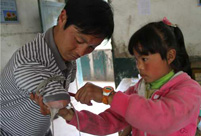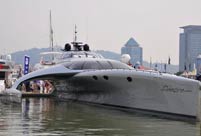SINGAPORE, Oct. 21 (Xinhua) -- Chinese Vice Premier Zhang Gaoli started an official visit to Singapore on Monday to strengthen ties between China and the Southeast Asian nation.
During his three-day visit, Zhang is scheduled to meet with Singaporean President Tony Tan Keng Yam and Prime Minister Lee Hsien Loong.
He, together with his Singaporean counterpart Teo Chee Hean, will co-chair the 10th meeting of China-Singapore Joint Council for Bilateral Cooperation, a high-level institutional mechanism established in 2003 to oversee the entire range of bilateral cooperation.
Zhang will also preside over the 15th China-Singapore Joint Steering Council Meeting for the Suzhou Industrial Park and the sixth China-Singapore Joint Steering Council Meeting for the Tianjin Eco-city.
The Suzhou Industrial Park and the Tianjin Eco-city are two flagship projects between the two governments to promote their cooperation in high-tech industries and sustainable development.
"These two projects show that the two countries are constantly reviewing their cooperation and identifying new areas of cooperation so that it stays relevant," Lye Liang Fook, assistant director of the East Asian Institute with National University of Singapore, told Xinhua in a recent interview.
He said that in addition to the flagship projects, the private sector-led and government-supported projects such as Guangzhou Knowledge City, Jilin Food Zone and Singapore-Sichuan Hi-Tech Innovation Park, also underscore the mutually beneficial cooperation between the two countries, despite the difference in the size of them.
"The key concepts of mutual benefit and mutual respect, I think, are strongly demonstrated in the relationship between China and Singapore," he said.
Since the establishment of diplomatic relations in 1990, bilateral cooperation between China and Singapore flourished and deepened in various fields.
The two-way trade between China and Singapore grew 24 times to 69.3 billion U.S. dollars in 2012, from 2.8 billion dollars in 1990, while mutual visits amounted to a total of 2.8 million person-times last year.
"Ties between our two countries are not the same with the one 23 years ago," Duan Jielong, Chinese ambassador to Singapore, said. "The relationship between China and Singapore is getting closer and closer."
Built on the past success, China and Singapore have gone beyond major projects to expand their cooperation into new areas such as financial services, services trade as well as social management.
Last October, the local units of the Bank of China and the Industrial and Commercial Bank of China (ICBC) were both granted qualifying full bank licenses, winning greater access to the Singapore financial market.
In February this year, ICBC Singapore was designated as the clearing bank for the Chinese currency RMB, the first clearing bank outside the China markets. In March, the Monetary Authority of Singapore and the People's Bank of China agreed to double the size of the bilateral currency swap facility to 300 billion yuan ( 49 billion U.S. dollars).
Financial cooperation between the two countries has provided strong support for future trade and economic cooperation.
Singapore is also an attractive investment destination for China, with Chinese companies such as Sinochem, COSCO and Huawei currently operating here and leveraging on Singapore's connectivity to the region. Property developers like Wanke, e- commerce leaders Alibaba and Jingdong, are also tapping on the Singaporean market and use it as a springboard to explore the larger Southeast Asian market.
"The economies of China and Singapore are highly complementary. In order to build an upgraded version of bilateral relations, the two countries should further tap their respective potential and identify new highlights for cooperation," Duan said.
 No news of survivors in Lao Airlines crash
No news of survivors in Lao Airlines crash Five fighters in flight training
Five fighters in flight training London mayor hails free trade, subway system on China tour
London mayor hails free trade, subway system on China tour Chalk it up to great courage
Chalk it up to great courage Tibetan girl helps mobilize volunteers onlin
Tibetan girl helps mobilize volunteers onlin Photo story: A day in the life of a car model
Photo story: A day in the life of a car model Chinese screen goddesses from Beijing Film Academy
Chinese screen goddesses from Beijing Film Academy  Weekly Sports Photos
Weekly Sports Photos World's most amazing yacht on display in Guangzhou
World's most amazing yacht on display in Guangzhou Bayi Parachute Team of PLA Air Force
Bayi Parachute Team of PLA Air Force World has never been dark-- a blind kid’s life in Tibet
World has never been dark-- a blind kid’s life in Tibet The last family in shantytowns
The last family in shantytowns UNESCO world heritage site: Montale Tower
UNESCO world heritage site: Montale Tower U.S. Senate leader announces bipartisan deal
U.S. Senate leader announces bipartisan deal Fiber-optic wedding dress show shinning in Suzhou
Fiber-optic wedding dress show shinning in Suzhou Day|Week|Month